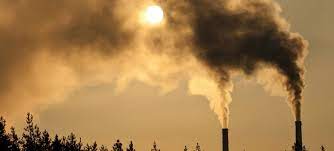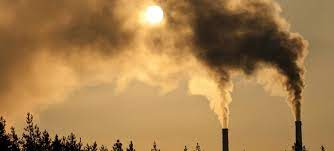
Greenhouse gas concentrations rose at above-average rates to new highs last year, according to the United Nations weather agency, which warned that time is running out for people to make the transformational changes required to limit global temperature rises.
The World Meteorological Organization's annual report is the first of several to be released ahead of a United Nations climate summit next month in Egypt, and it aims to spur leaders to action.
It demonstrated that increases in the atmospheric concentrations of all three greenhouse gases - carbon dioxide, methane, and nitrous oxide - outpaced the average increase over the previous decade, implying that they are now all at new record levels.
Carbon dioxide concentrations increased by 2.5 parts per million to 415.7, a level not seen since at least 3 million years ago when the Earth was much warmer. According to the report, the increase in the potent, heat-trapping gas methane was the highest since records began in 1983. Methane is the second most important greenhouse gas after carbon dioxide.
"The continuing rise in concentrations of the main heat-trapping gases, including the record acceleration in methane levels, shows that we are heading in the wrong direction," said WMO Secretary-General Petteri Taalas, calling for a transformation in energy, industry and transport systems.
"The needed changes are economically affordable and technically possible. Time is running out," he said.
Greenhouse gases are to blame for global warming and extreme weather events such as heatwaves and heavy rain. In contrast to emissions that can be reduced, such as reduced travel and industry during the pandemic, much of the carbon dioxide emitted decades ago remains in the atmosphere and activates slow processes such as sea-level rise over millennia.
According to the WMO, scientists are looking into why methane levels increased by 18 parts per billion to 1,908 last year, following a similar increase in 2020. Wetlands, landfills, and rice paddies contributed the most, which the WMO attributes to warmer weather hastening natural decomposition processes.
Oksana Tarasova, a senior scientific officer at the World Meteorological Organization, advocated for the expansion of the monitoring network, particularly near wetlands. "This is pretty frightening; you can't know where you're going unless you understand the exact processes," she said.
(Source:www.heraldsun.com.au)
The World Meteorological Organization's annual report is the first of several to be released ahead of a United Nations climate summit next month in Egypt, and it aims to spur leaders to action.
It demonstrated that increases in the atmospheric concentrations of all three greenhouse gases - carbon dioxide, methane, and nitrous oxide - outpaced the average increase over the previous decade, implying that they are now all at new record levels.
Carbon dioxide concentrations increased by 2.5 parts per million to 415.7, a level not seen since at least 3 million years ago when the Earth was much warmer. According to the report, the increase in the potent, heat-trapping gas methane was the highest since records began in 1983. Methane is the second most important greenhouse gas after carbon dioxide.
"The continuing rise in concentrations of the main heat-trapping gases, including the record acceleration in methane levels, shows that we are heading in the wrong direction," said WMO Secretary-General Petteri Taalas, calling for a transformation in energy, industry and transport systems.
"The needed changes are economically affordable and technically possible. Time is running out," he said.
Greenhouse gases are to blame for global warming and extreme weather events such as heatwaves and heavy rain. In contrast to emissions that can be reduced, such as reduced travel and industry during the pandemic, much of the carbon dioxide emitted decades ago remains in the atmosphere and activates slow processes such as sea-level rise over millennia.
According to the WMO, scientists are looking into why methane levels increased by 18 parts per billion to 1,908 last year, following a similar increase in 2020. Wetlands, landfills, and rice paddies contributed the most, which the WMO attributes to warmer weather hastening natural decomposition processes.
Oksana Tarasova, a senior scientific officer at the World Meteorological Organization, advocated for the expansion of the monitoring network, particularly near wetlands. "This is pretty frightening; you can't know where you're going unless you understand the exact processes," she said.
(Source:www.heraldsun.com.au)














